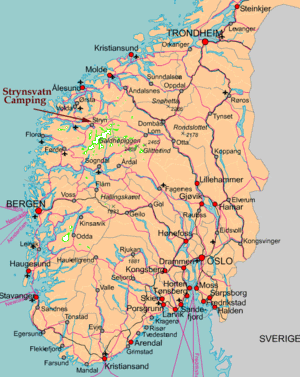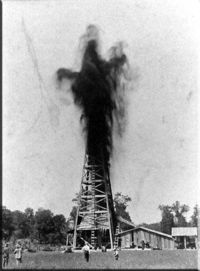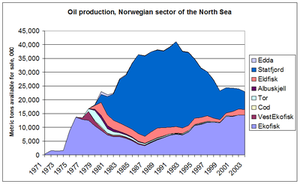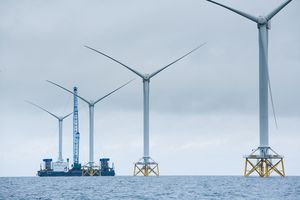Think of this as Volume 17, Number 36 of the newsletter I have written weekly since March, 1997. Enjoy.

Its history as an independent state
only goes back to 1905, when the people “asked” for independence
and Sweden gave it, because it would cost Sweden too much to keep it.
Sweden didn't know about the oil. Back
then, oil was refined for kerosene and paraffin. It mainly existed
for heat and light, not transportation. It was inexpensive, and
plentiful.
Back in 1905 Texans had just found it in vast pools just a
few hundred feet down, at Spindletop. No one imagined that demand
from gasoline-fueled cars would become so vast as to make oil into
black gold, or that technology would advance to the point where you
could drill for oil over four miles deep from far offshore.
What's now Norway had, by 1905, been
the property of other Scandinavian kings for 300 years, first
belonging to Denmark, then being given to Sweden in the aftermath of
Napoleon's defeat.

the Queen Margaret, a Norwegian native, who put her sons on the
thrones of Denmark and Sweden. They like to talk about a King
Christian, another Dane, who ruled Norway well and cared about the
people. In Alesund they talk about Rollen, who conquered northern
France over 1,000 years ago, although the Danes insist he was
actually one of them and want his statue back.
But this is window dressing. For most
of its history Norway was a colony, and a fairly bleak one. The Black
Death devastated it, fires destroyed whole cities, men died trying to
pull fish from the sea, women and children died from the cold or when
the crops failed. Norway sent the second-largest percentage of its
people to America in the 19th century of any European
place – excepting only Ireland. Ireland was a colony then, too.
What made modern Norway was oil. Since
the late 1970s, Norway has been Europe's Arabia. Rather than moving
to Beverly Hills, Norway used its wealth to turn itself into a
pleasure dome. Taxes may be high, but you can live along any fjord,
and find yourself in a home with an income. Every town is new, clean,
with First World amenities, and tunnels whose tolls disappear when
they're paid off connecting the islands. There are only 5 1/2 million
people, even now, to share all this wealth. They have spread out
across the fjords, because they can, living in comfort, getting an
education, enjoying sport and vacation, and letting the rest of us
think they invented the whole idea of peace. With a Swede's money, of
course.

awful smug about their own values. It reinforces those values,
whatever they are, and makes history into a morality play in which
they're not just lucky, but good. Better than other people, because
oil comes out of their ground. Texas thinks oil proves capitalism and
loud-mouthed individualism works. Arabs thinks oil proves that Islam
works. Norwegians think oil proves their egalitarianism works, that
their niceness works. They're very nice. If I had their money I'd be
nice, too.
But generosity goes only so far.
There's a reason Norway still has its currency, and a reason it's not
even in the EU. That reason is oil, deep under the sea, offshore. If
the oil had been found when Sweden still owned Norway, it would still
own Norway. Had oil not been found off Scotland until after it
devolved from England, Scots would be acting a lot like Norwegians.
If Norway joined the EU or the Eurozone it might have to share its
oil wealth, so there's a limit to nice. When nice gets someone else
reaching into your wallet, that's the limit.

limitless, so while I was cruising offshore they made more moves to
become independent of their oil. They're selling rights in their oil
to other countries in Europe, like Austria, building a war chest with
which they hope to get into America's fracking boom, and eventually
into others' oil pools. They want to invest in what they know, which
makes sense, and what they know, now, is how to pull oil out of the
ground.
They pretend they are good at other
things. In Alesund, they say Norway is a fishing culture. In the
fjords they say it's a tourist culture. In Oslo they say they have
insurance, and banking. All this is true. But all this comes from
oil. Without oil the fishing fleets can't run. Without oil there are
no amenities for tourists to visit. Without oil there is no money for
banking or insurance, nothing to invest.
Norway is oil, and oil is Norway.
If you're a Norwegian-American, Norway is a great place to be
from, and a great place to visit. It has become a great place for
summer cruising. Serving the boats gives many Norwegians something
to do, gives others something to show up for, and reinforces the smug
attitude that Norway isn't just lucky, but good, that Norwegians are
better than other people.

Texans are lucky, and Arabs are lucky. They're lucky to have enough
oil that their elites can spread some of the wealth, creating social
peace. But oil isn't going to be money much longer. Oil, like coal
and gas, is just something we pull out of the ground and burn,
because it's the only way we know to get energy.
Energy is not a product oil, but of
technology. We've evolved technology to take advantage of first coal,
then oil and now natural gas and uranium. We pull these things out
of the ground, burn them, and pretend that's energy. That's not
energy. The technology evolved to make these things fuel is energy.
And technology can go in other
directions. The Sun shines, the wind blows, the tides roll, and we
live on a molten rock. With technology there is energy for all, not
just for Norwegians and Texans and Arabs. And thanks to the high
prices charged by these people for what they call energy, there
exists enormous value in the cheapest form of renewable energy,
efficiency.
These first two decades of the 21st
century aren't the era of oil, or the era of solar power. They're the
era of efficiency. Every advance in efficiency pays for itself, every
advance finds a market. Efficiency reduces waste, and makes the world
cleaner. Efficiency is what the present economic recovery is about.
The high prices Norway now charges for
oil are producing a technology revolution that will make that oil
obsolete sooner than they, or anyone realizes. I wonder what Norway
will do then?










